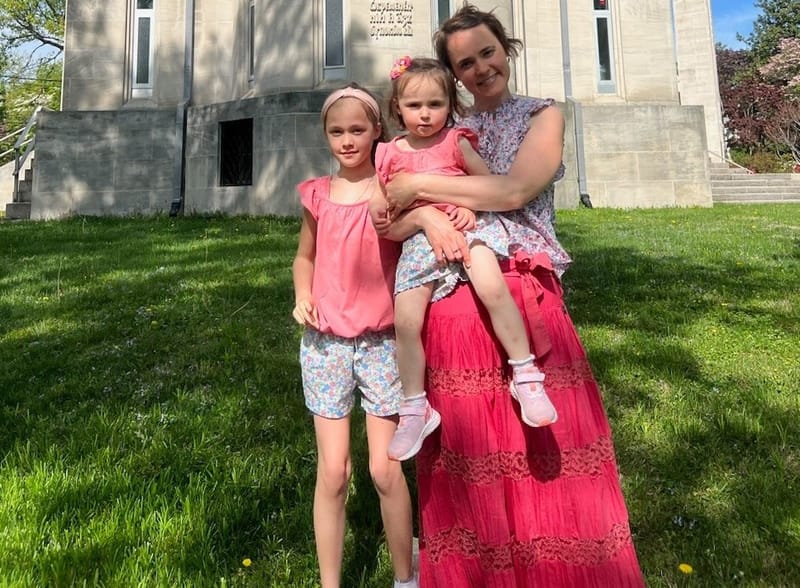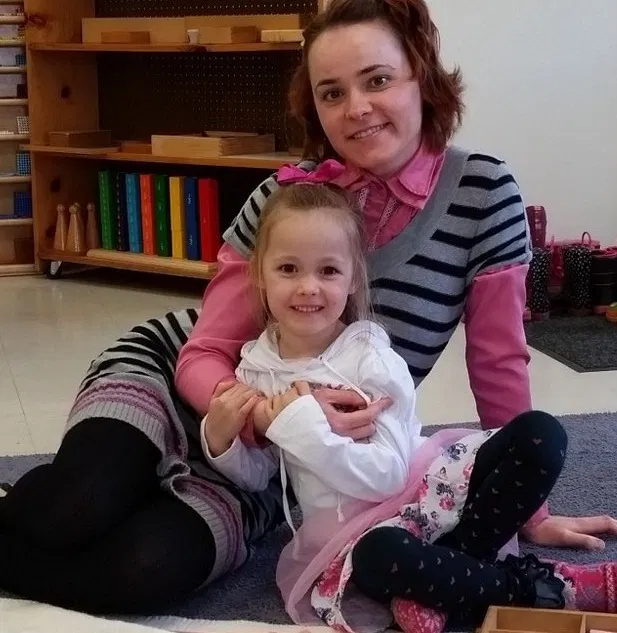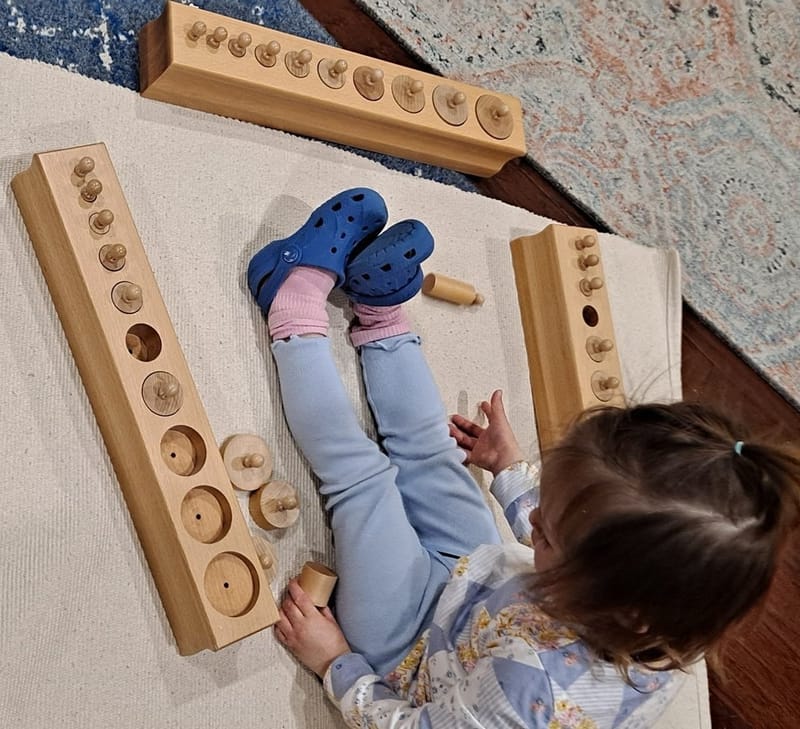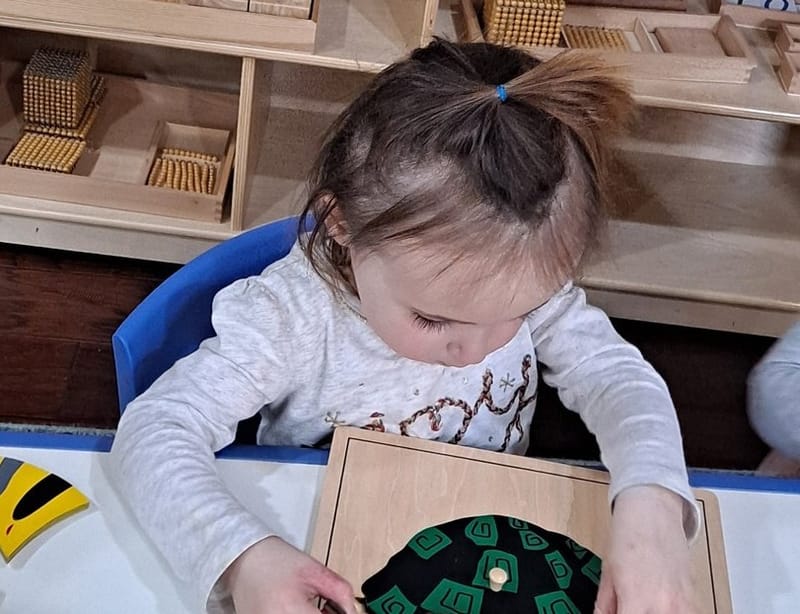APPLE BLOSSOM MONTESSORI
Montessori based family daycare.
License # 259548
For a tour CALL - 240-394-9440.
About
"The child is both a hope and a promise for mankind." Dr. Maria Montessori



My name is Olga, and I am the owner and Montessori certified teacher at our family daycare. I have been passionate about teaching since I was a child myself. After graduating from the university with a degree in teaching, I continued my career as a nanny, teacher, and language instructor in the United States.
In 2013, when my first daughter was born, I became fascinated with the Montessori philosophy and its outstanding pedagogy. I received my AMS certification in Montessori Early Childhood education through Montgomery Montessori Institute in 2015 and worked as a lead teacher at Village Montessori School for many years. My second daughter's birth in 2021 inspired me to open my own Montessori school at my home.
As a lifelong teacher and passionate advocate of the Montessori philosophy, I bring valuable teaching experience, creativity, and good communication skills to my classroom. I believe that children learn best through hands-on experiences, and I provide a variety of activities that encourage curiosity, exploration, and creativity. I am enthusiastic, patient, and organized, and I love to sing and create art projects with children. I strive to create an environment where children feel safe and loved and can become independent explorers, critical thinkers, and good members of the community.
Services
"The hand is the instrument of intelligence. The child needs to manipulate objects and to gain experience by touching and handling." Dr. Maria Montessori
Montessori inspired daycare with strong PRE-K State Program
10-month program Aug - June
Ages - from 2 to 5 (PRE-K - 3-5)
Snacks and Pizza Friday lunches included
Montessori certified teacher and experienced assistant (2:8 ratio)
NAFCC accredited and Level 5 EXCELS
PreK Program
FREE Pre-K Program Available For eligible families based on Maryland Pre-K guidelines ✔ Income-eligible ✔ Multilingual households ✔ Children with IEP/IFSP ✔ Foster care or housing instability Check for more information: https://www.aspireprek.org/forparents
Eligibility Criteria
A child (3-5 year old) may qualify for free Pre-K if at least one of the following applies: 1. Household income is at or below 300% of the Federal Poverty Level (FPL) 2. A language other than English is spoken in the home 3. The child has an IEP (Individualized Education Program) or IFSP (Individualized Family Service Plan)
Admission
"The most important period of life is not the age of university studies, but the first one, the period from birth to the age of six." Dr. Maria Montessori

Enrollment is on a first come first serve basis and the space is only for 8 children from age 2 to 5.
Enrollment Process:
- Schedule a visit: We encourage families to visit our daycare center and see our program in action. This is an opportunity for you to meet the teacher, see the classroom, and ask any questions you may have. Please call Olga to schedule a tour - 240-394-9440.
- Submit a $50 non-refundable application: After your visit, you can submit an enrollment application. We will review your application and contact you to schedule an interview.
- Interview: During the interview, we will discuss your child's needs and goals, and how our program can support them. This is also an opportunity for you to ask any remaining questions you may have.
- Acceptance: If we determine that our program is a good fit for your child, we will offer you a spot in our daycare. Once you accept the spot, we will send you all the necessary forms and information for enrolling your child.
Montessori Method
"The aim of education is to allow the child to develop into a complete human being with a sense of wonder and a love for life." Dr. Maria Montessori
Practical Life
Practical Life is crucial in Montessori, fostering independence, coordination, concentration, order, and responsibility. It uses familiar objects like utensils, cleaning tools, and dressing frames, to teach life skills such as pouring, scooping, cutting, washing, and buttoning.
Sensorial
The materials in the Sensorial Area are designed to isolate specific sensory qualities, such as color, shape, texture, size, weight, and sound. Materials include the pink tower, color tablets, sound cylinders, and more. Each material offers a unique sensory experience for the child.
Language
Real-life materials and activities are essential for language development in the Montessori method. Our language area offers sandpaper letters, moveable alphabets, picture cards, and story books to help children learn letter sounds, shapes, words, and sentences.
Math
The Math Area in the Montessori classroom is designed to provide children with a hands-on, concrete understanding of mathematical concepts. Materials are sequenced from concrete to abstract, beginning with the spindle box and number rods to teach numbers and counting. As children advance, they work with more intricate materials to learn addition, subtraction, multiplication, and division.
Science and Geography
In the Science Area, children explore the properties of materials and living things, and basic physics and chemistry concepts using magnets, prisms, and magnifying glasses. In the Geography Area, children learn about the physical features of the earth, cultures, and traditions worldwide using materials like globes and puzzle maps to develop spatial awareness.
Tuition
"Education is the best weapon for peace." Dr. Maria Montessori
Full Time
- Monday - Friday
- 8am - 4:30pm
- morning and afternoon Montessori work time
- everyday snacks and pizza Friday lunch included
Part Time
- Monday - Friday
- 8am - 1pm
- morning Montessori work time
- everyday snacks and pizza Friday lunch included
Schedule
"Free the child's potential and you will transform him into the world." Dr. Maria Montessori
Daily schedule
Arrival
free play, books, art
Montessori Morning Work
independent work with the materials, snack is provided
Circle Time
calendar, unit study, music, storytime
Outside Time
free play at the beautiful playground or nature walk
Lunch Time
Mon-Thu lunches are from home, Pizza Friday lunch is provided
Clean up
part time children go home
Nap time
all children have quiet time
Afternoon Montessori Work
more work with Montessori materials (afternoon snack is provided)
Outside time/Free Play
For parents
"The goal of early childhood education should be to activate the child's own natural desire to learn." Dr. Maria Montessori
Contact
"Play is the work of the child." Dr. Maria Montessori
- 13423 Autumn Crest Drive, Mount Airy, Maryland, United States
- Monday - Friday 8am - 4:30pm


